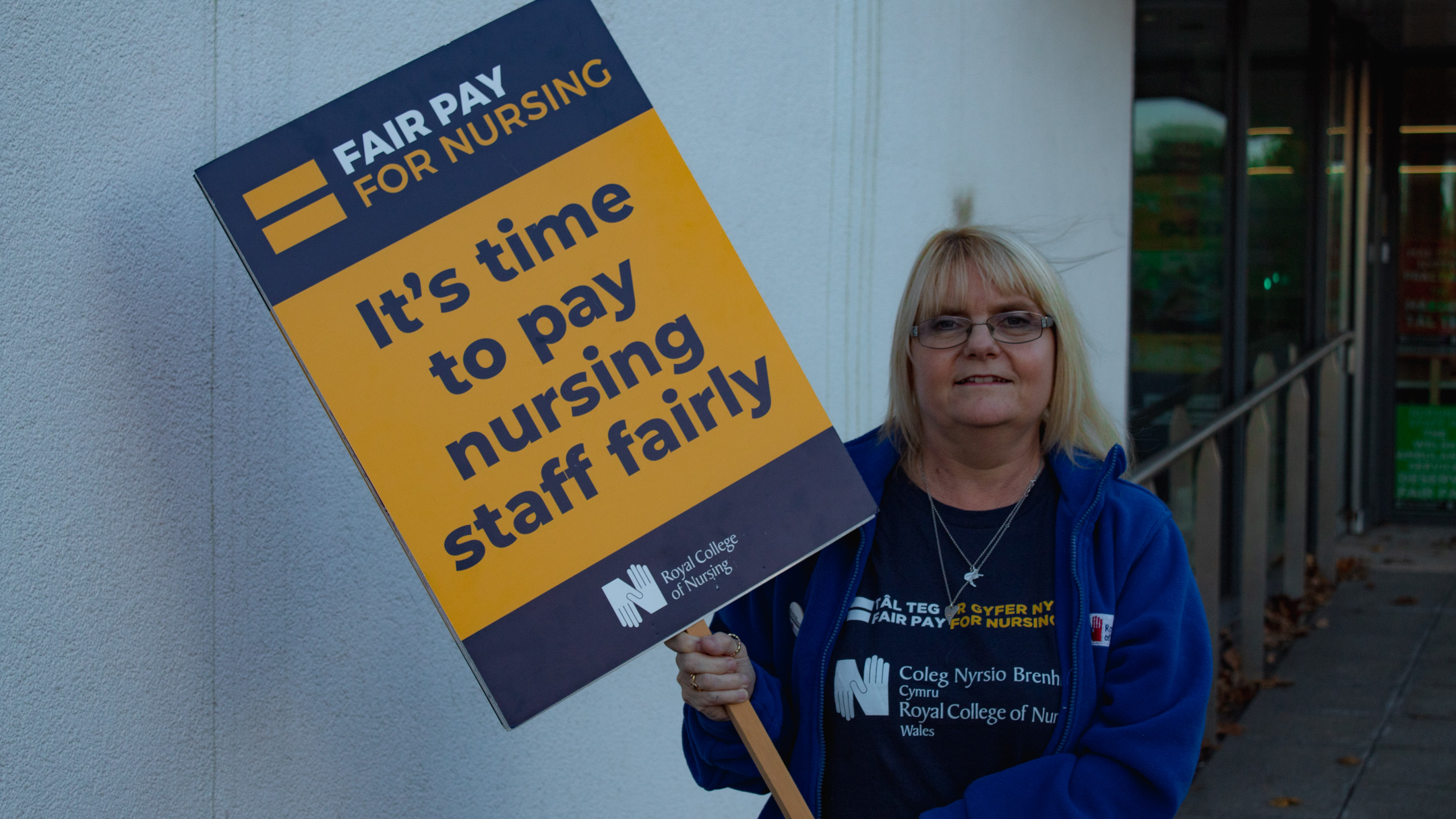
“We Are Ready To Take Them On” — RCN Deliver Ultimatum To Welsh Government
By Adwitiya Pal. Cover image: Nicky Hughes of the RCN, by Adwitiya Pal
Following the overwhelming vote to strike, the Royal College of Nursing have said that they will announce dates for strike in Wales if the government doesn’t open discussions. RCN’s Nicky Hughes speaks to voice.wales in this exclusive interview.
The Royal College of Nursing’s (RCN) office in Cardiff is situated right next to the largest hospital in Wales, the University Hospital of Wales. So when hundreds of nurses are going in for their shifts, it’s hard for them to miss the big blue banner calling for fair pay for nurses.
“I see a lot of nurses walking past every day,” says Nicky Hughes, the Associate Director of Nursing at RCN Wales. “They don’t look happy.”
On 9 November, the RCN released the results of its ballot for industrial action, and the nurses’ consensus was overwhelming and unanimous. In a historic move, RCN’s nurses had decided to go on strike across almost the entirety of Wales for the first time in their 106 year history.
On Thursday last week, the union issued the Welsh government five days to open formal negotiations, otherwise the official dates for the strike will be announced.
The RCN has told voice.wales that they are waiting to see what the government does, and an announcement can be expected later this week. Nicky Hughes says, “Now is the time to stand up to the Welsh Government to not only get the nurses a fair pay award, but also to provide safe staffing for the patients that they look after day in and day out.”
According to Nicky, going on strike is not something manynurses want to do but are fully capable of. “What we really want is for the Welsh Government to sit around a table and have negotiations. But obviously, if they won’t come around the table, then we have to do something to get them to listen.”
This has been a long time coming, says Nicky. “Everybody thinks nurses will never strike. Because it is a public service, they will just go on and step up time and time again, just like during the pandemic. Now we are actually standing up for ourselves and our patients.”
The RCN’s own research has shown that an experienced nurse has seen their pay decrease by at least 20% since 2010.
The Welsh government, following Downing Street’s decision, has offered a pay rise of £1400, or just 72p an hour to health workers including nurses. Instead, RCN is calling for a pay rise of approximately 17%, or 5% above inflation to help make up for a decade of pay suppression.
But RCN’s concerns are much larger. The union claims that the short staffing in the nursing sector has led to a complete compromise of patient safety. In the last year, 25,000 nursing staff around the UK left the Nursing and Midwifery Council register. In Wales alone, there are 3000 vacancies, up from 1719 in 2021.
The nurses who have chosen to stick around are unfortunately being put under immense pressure and stress, says Nicky. “Members are absolutely frustrated, they feel completely devalued. They are upset before going on shifts. They are worried about patient care when they go home. They are worried if they’ve done enough to keep those patients safe.”
In order to ensure that critical patients are still looked after during the strike, RCN is working along with health boards to ensure life-preserving services are maintained.
However, services that aren’t considered absolutely essential will be cut, says Nicky. “Obviously, any strike is about disruption,” she points out.
Although morale among nurses is quite low in general, they are feeling upbeat and optimistic about the strike. “We are ready for this fight. We are ready to take the Welsh government on,” says Nicky.
However, being the first time that nurses are participating in industrial action in Wales, there are also a few who are concerned about whether they’re allowed to go on strike. That’s why the RCN has been a visible presence among the nurses since the balloting phase and plans on being so until they achieve what they set out to.
“We are telling our members that what we are doing is lawful. You are legally allowed to withdraw labour as long as you’re our member and you’re taking action as part of our statutory ballot within the health boards that met the threshold.”
All health boards in Wales managed to meet the minimum 50% voter turnout mandated by law, except the Aneurin Bevan University Health Board in South Wales. Even though over 90% of the members voted yes for strike action, they missed out on the threshold by just 11 votes.
Right now, the RCN’s elected council is deciding the next steps on how Aneurin Bevan Health Board can still support strike action — with a re-ballot not off the cards.
There are no dates decided for the strike yet, but it is expected that walkouts will start before the end of this year. Nicky Hughes says that everything depends on whether they hear back from the Welsh Government, which is unlikely to happen until the UK Government first comes around the table since the Senedd claims that they are beholden to Westminster for funding.
This is something that the RCN strongly contests. “Whatever the decision made by the UK Government, the Welsh Government has ways of funding a decent pay award that reflects the work, the expertise and the skill of our nursing staff,” says Nicky.
In 2021-22, NHS Wales spent £133.4 million on agency nursing, an increase of 41% from the previous year. This would have paid the salaries of 4,930 newly qualified nurses. While agency nurses are also similarly qualified as NHS nurses, they pose two major problems according to Nicky.
“They [agency nurses] don’t work on that clinical area on a regular basis. Some of them don’t even live in Wales, so they aren’t familiar with the policies, the equipment, the ward area, how the shift progresses or who to go to if there’s an issue. The continuity for those patients is very poor because they see different people coming in all the time. You don’t get good teamwork because you don’t have a cohesive team that works together frequently.”
“This also piles pressure on the ward nurses. We are hearing so many times that there are wards with just one registered nurse. Since agency nurses haven’t always had the training to use the equipment, the NHS nurses have to undertake all the tasks that agency nurses can’t do.”
RCN Wales has challenged Health Minister Eluned Morgan on why the government isn’t reinvesting the agency funding into the NHS to improve wages. However, there has been no response to RCN’s requests. “They are a Labour government and they’ve been in power for the last 20 years. They say they are against the privatisation of public services, yet we are seeing this happen.”
Last week, Eluned Morgan wrote a letter along with the Scottish Health Minister to the UK Health Secretary Steve Barclay, requesting for more funds to be made available for awarding pay rises in the NHS. However, Prime Minister Rishi Sunak has already gone on record saying that RCN’s demand for a 17% pay rise is ‘not affordable’.
Thankfully for nurses, the public is largely in solidarity with them. A recent YouGov Poll in Wales showed that 85% of the public support their demands for a pay rise.
“After Covid, people are starting to understand that nursing is a highly complex, intense profession and is safety-critical,” says Nicky Hughes. “There are not many professions where you can say that people’s lives are at risk if you don’t treat them the right way.”
Other unions with members in the NHS, like UNISON, Unite, and GMB are also currently balloting their members for industrial action, and most of them are expected to release their results before Christmas. It remains to be seen if RCN decides to coordinate its strike action with the rest of the unions.
Nicky says that they’re determined to work closely with other unions, but they’re in a unique position where they can start building up pressure on the government right away. Once other unions finish their ballots, RCN will be looking at the bigger picture again, but as of now they are in no mood to hang around.
“Our members have given us a really high and clear mandate that they want to go on strike action. We owe it to them to do that as soon as possible,” she says. “Our members deserve that we support them in strike action as soon as possible, and that’s what we’re doing.”


